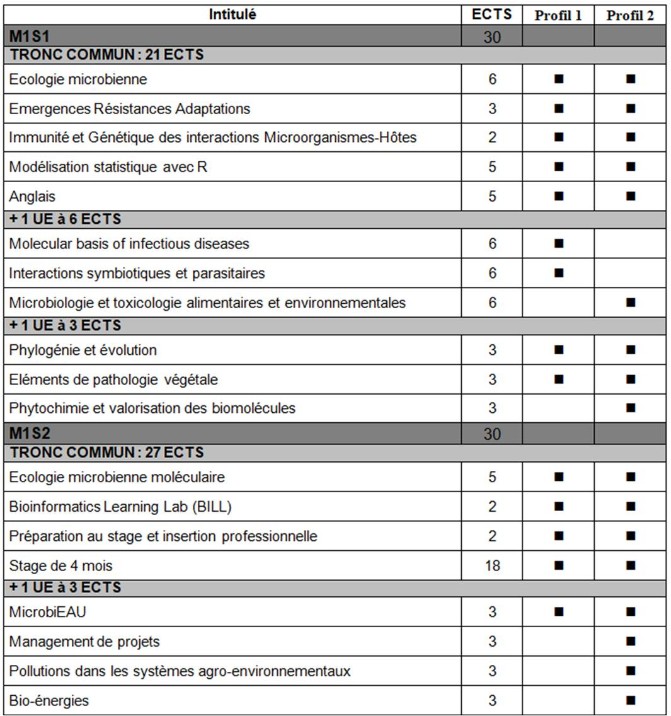ECTS
60 credits
Duration
1 year
Training structure
Faculty of Science
Language(s) of instruction
French
Presentation
The first year of the M1 program forms the foundation of the course, covering the fundamentals of microbial ecology. It offers a core curriculum and optional courses that allow students to choose between two profiles: one focused on "Fundamental Research" (profile 1) and the other more oriented toward "Research & Development" (profile 2).
Project-based learning and educational innovation are emphasized. Thanks to the pooling of skills with the Faculty of Science's Master's program in Bioinformatics and the establishment of a BioInfoLearning Lab (BILL), an innovative interdisciplinary learning laboratory, students are encouraged to take an active role in their education by managing a mini-research project from start to finish (from field sampling to extraction, sequencing, and analysis of microbial sequences in M1) and promoting their results (publication, presentation at conferences in M2).
The program focuses on teaching students how to conduct scientific research. Students work on bibliographic resources (research, comprehension, critique, and bibliographic synthesis) and pedagogical communication methods. They complete a four-month internship in their first year of the master's program in a public or private research laboratory or in a company, writing a thesis and defending it orally before a panel of specialists.
95%
Success rate
Organization
Open alternately
This course is available on a work-study basis.
Internships, supervised projects
Internship | Mandatory |
|---|---|
Duration of the internship | 4 |
Internship abroad | Possible |
Duration of the internship abroad | 4 |
Program
The first year offers a core curriculum and optional courses that allow students to choose between two profiles: one focused on "Fundamental Research" (profile 1) and the other more oriented toward "Research & Development" (profile 2).
Students in Profile 2 (based on application selection) have the opportunity to earn a double degree by taking four additional 5-ECTS course units offered by the IAE Montpellier (two course units per year, for a total of 20 ECTS).
Students complete a four-month internship in their first year of the master's program in a public or private research laboratory or in a company, writing a thesis and defending it orally before a panel of specialists.
One EU is dedicated to professional integration, in which students work on their resumes and their professional and personal projects.

Biostatistics with R
5 creditsEnglish
5 creditsImmunity and genetics of microorganism interactions
Microbial ecology
6 creditsOPTION 3
3 creditsChoose one of two options:
Emergencies Resistance Adaptations
3 creditsOPTION 1
6 creditsChoose 1 out of 3
Bioinformatics Learning Lab
2 creditsPreparation for internships and professional integration
2 creditsMolecular Microbial Ecology 1
3 creditsMolecular Microbial Ecology 2
2 credits4-month M1 internship
18 creditsOPTION 4
3 creditsChoose 1 out of 6
Integrative Parasitology (University of Perpignan)
3 creditsMicrobiEAU
3 creditsBioenergy
3 creditsPollution in agro-environmental systems
3 creditsProject management
3 creditsBioprocess engineering - Metabolism and bioproduction
3 credits
Admission
Admission requirements
Students must hold at least a Bachelor's degree in Life Sciences and have completed course units in microbiology.
Registration procedures
Applications can be submitted on the following platforms:
- French and European students: follow the "Mon Master" procedure on the website: https://www.monmaster.gouv.fr/
Target audience
The IMHE Master's program is part of the curriculum that follows the Bachelor's degree in Life Sciences, Microbiology track, at the University of Montpellier (Faculty of Sciences, Department of Biology-Mechanisms of Life). It is open to students with a Bachelor's degree in Life Sciences with a specialization in Microbiology, obtained in France or abroad. It also offers specialization in microbiology for students in medicine, pharmacy, dentistry, and engineering students from schools specializing in life sciences and agronomy (such as Montpellier SupAgro).
Mandatory prerequisites
Microbiology, Biochemistry, and Cellular and Molecular Biology at the Bachelor's Degree Level
Recommended prerequisites
A minimum level of computer skills and English is recommended.
And after
Continuing education
At the end of the M2, students take entrance exams for doctoral programs, notably GAIA, which oversees the Master's program, or they can enter the R&D sector in companies; these career choices are made possible by the continuity of the two M1 profiles.
We encourage students who wish to pursue entrepreneurship to enroll in the IMHE FdS/IAE Management and Business Management dual degree program, which will be available starting in the 2021 academic year.
Students can continue their studies by enrolling in a Master's degree in Bioinformatics or a Master's degree in Education (MEEF) to prepare for teaching exams.
Continuing studies abroad
Thanks to the network of international collaborations maintained by the Montpellier laboratories and the numerous links between the Master's teaching teams and foreign laboratories, both M1 and M2 internships can be carried out abroad (mainly in Europe and North America, but also in Asia, Africa, and Latin America). This gives students the opportunity to pursue a PhD in the laboratory where they completed their internship or to join international PhD programs. This opportunity is not limited to students who complete their Master's internship abroad; it is also widely open to those who complete their internships in Montpellier or other research centers in France.
Gateways and reorientation
Our M1 students can switch to the Master's in Biology and Health, in the Infection Biology or IBIS tracks.
Professional integration
The IMHE program offers students the opportunity to pursue a variety of professional goals, with a high placement rate for doctoral students (40 to 50% depending on the year) or career opportunities in companies immediately after graduation.
The professions resulting from this training are:
- Professor and researcher
- Research and Development Engineer
- R&D executives in the fields of plant protection, agri-food, health, and microbial biotechnology
- Experts and project managers
- Teacher and trainer
The fields of employment in microbiology are vast, covering health, agriculture, food, cosmetics, health and safety, the environment, biotechnology, and more.
Specific course units provide students with the foundations and tools they need to enter the workforce.


